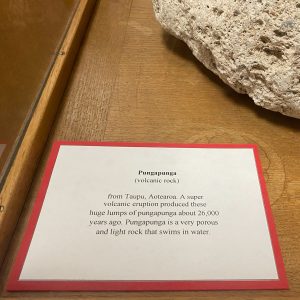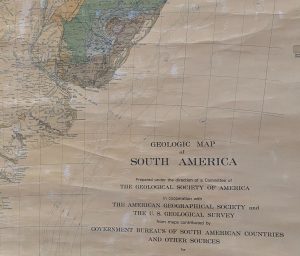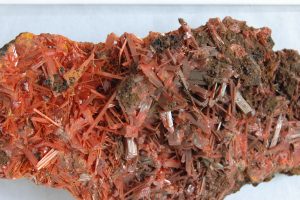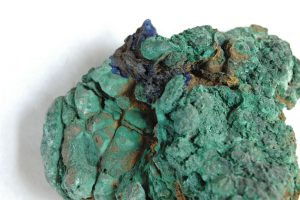Context
It is recognised that universities and their collections, together with the practice and discipline of geology, are linked to past and present colonialism. This includes the study and mapping of foreign lands with colonial and Eurocentric approaches, the extraction of natural resources overseas and the lack of indigenous views in collection archives and research publications. Closer to home, the School of Earth Sciences is based in the Wills Memorial Building, which was built from wealth made on tobacco plantations where enslaved labour made up the majority of the workforce. The School of Earth Sciences is committed to acknowledging and reflecting on its colonial legacies at all levels and at wide by taking a range of actions:
- Establishment of the Decolonisation Working Group as part of the Student Staff Liaison Group 2022.
- Collaboration via the University of Bristol Curators Group on all aspects of decolonising collections. The group feeds directly into the UoB Anti-Racism Steering Group and HPAC.
- Running and supporting workshops that address colonial legacies, building links with communities groups and experts.
- Decolonisation of the curriculum and research and instilling a more inclusive research culture via the School Equity, Diversity and Inclusion Committee.
Examples of work undertaken include:
Migrating Rocks (funded by Funded by Brigstow Institute Seedcorn Fund 2024, Duration: Jan – Oct 2024, Co-leads: Alyson Hallett, Claudia Hildebrandt, Edie Woolf, Ery Hughes, Fiona Jordan, Geoff Kilgour, Lucy Donkin, Tanira)
Could rocks and samples held in geological collections, their associated histories and related indigenous worldviews help us all begin to understand more fully our relationships with the land and our planet, our past and global future, our cultural and natural heritage? The project focuses on a case study of a collection of volcanic rocks from Aotearoa New Zealand (Tarawera volcano) which was collected and brought to the UK for scientific analysis using methods unavailable in Aotearoa. Extraction required permission from the local iwi (tribe) Ngāti Rangitihi and the samples were only released from their rohe (land) after an agreement was made to return these samples to the maunga (mountain) once research had been completed. Co-created research of our key questions through this case study will help develop a deeper understanding of timescales, opportunities and challenges associated with repatriation of rocks, ethical negotiations, awareness of colonial bias, a readiness to explore radically different ways of thinking and working.
https://www.bristol.ac.uk/brigstow/research/projects/2024/migrating-rocks.html
Global Heritage, Local History (funded by Public Engagement UoB from the Research England QR Participatory Research Fund (QR PRF) 2022-23, Duration March – July 2023, Lead: Claudia Hildebrandt)
Historic geological collections are unique resources that reconnect us with the natural world beneath our feet as well as the planet’s and our very own human history. They offer an opportunity to collaboratively explore global themes like climate change, management of natural resources or changes in biodiversity as well as colonialism and imperial legacies. This project aims to bring global and Bristol-based communities together via an online platform to pilot a new approach of collaborative collection research. The platform will hold images and collection information, inviting public contributions to co-develop new storylines linked to Bristol’s global geological collection. https://earthsciences.blogs.bristol.ac.uk/global-heritage-local-history/
How do we ethically decolonise a rock and mineral collection? (Funded by Brigstow Institute Ideas Exchange Fund 2023, Duration: March – July 2023, Co-leads: poet Alyson Hallett, curator Claudia Hildebrandt)
What research can be done into the practice of how to ethically decolonise rock and mineral collections? And how can we bring curatorial practice, poetry, academic thinking and art into the development of decolonising processes?
The aim of this project is to establish an interdisciplinary network of people to co-develop and explore ethical ways and methodologies of researching and discussing the colonial histories of the University of Bristol Earth Sciences Rock and Mineral Collection. We want to explore how the naming, descriptions and scientific classifications of rocks, minerals and fossils have been and are limiting our understanding of these collections in the 21st century, from a civic Bristol perspective but also a UK wide and international perspective. We want to investigate how incorporating diverse, indigenous and community driven knowledge and language can be a catalyst for a more enriching, personal and empowering connection with the rocks and resources beneath our feet.
More about the Brigstow Ideas Exchange projects: https://brigstowinstitute.blogs.bristol.ac.uk/project/how-do-we-ethically-decolonise-a-rock-and-mineral-collection/
Exhibitions and terminology: In September 2022, the new EarthArt exhibition ‘Impact’ opened in the Wills Memorial Building. The exhibition is the result of a six-month Fellowship in the School of Earth Sciences during which poet Alyson Hallett collaborated with volcanologist Professor Alison Rust and many other academics explored the meaning and mechanisms of impact.
Part of the collaboration and exhibition development focused on addressing colonial legacies in natural science collections. Collections Manager Claudia Hildebrandt worked closely with artist Alyson Hallett to re-establish indigenous links to objects on display and to incorporate indigenous language and terminology into displays.

Geological Map Collection review: Over the past few years, the School has reviewed its large collection of over 3000 geological maps to gain a better understanding of its extent, historical relevance and teaching and research potential.
Geological surveys, although often part of a broader expedition exploring questions of natural history, anthropology and geography, were an instrumental tool of colonial expansion (e.g. Stafford, 1984 and 1988; Sangwan, 1993; Yusoff, 2018; Figueiredo, 2020; Zeller, 2000). Many cases of colonial expansion and occupation were driven by the search for natural resources (Stafford, 1988) including ores and stones and relied initially on indigenous knowledge. When maps were created however, they often had a Eurocentric view (type of map projection) and when these maps entered into western collections, they were catalogued according to western conventions, often dividing them up into the simplistic binary of scientific/traditional or European/non-European.
As part of this ongoing work in the School, the team has explored the colonial legacies of geological maps and how the material housed at the University of Bristol can inform decolonial approaches to caring for, managing and interpreting map collections e.g. the integration of indigenous mapping knowledge and terminology into cataloguing practices.

Return of geological samples to indigenous communities: In July 2022, the School of Earth Sciences returned a set of geological samples to the indigenous Māori-Iwi community near Tarawera in Aotearoa New Zealand. The samples arrived in Bristol over 10 years ago, to be studied and analysed as part of a PhD research project. Before removing and exporting the samples, the Māori-Iwi community gave permission for the geologists to access their land and collect rocks for scientific research. Ery Hughes, former PhD student in the School of Earth Sciences and now Volcanic Fluid Geochemist at Te Pū Ao / GNS in New Zealand, who worked on the sample set, and Collections Manager Claudia Hildebrandt, collaborated over the summer 2022 to retrieve the catalogued samples from the archives, wrap and pack them up for a safe return in liaison with the Māori-Iwi community.
Ery Hughes: “…when I had to do my fieldwork out there, we were definitely involved with talking with the Māori-Iwi, who have guardianship of Tarawera…, to gain access to the mountain because it is their land. But also, to make sure that the areas we were going on Tarawera were acceptable to them, because it’s has quite a lot of cultural significance to them.”
Mineral Collection Documentation project
Over the past year, the University of Bristol’s mineral collection has been revisited for the purpose of digitisation. Volunteer Donovan Hawley has spent a day a week capturing label information, merging existing Excel spreadsheets and photographing specimens. A review of the geographic origins of the mineral specimens has shown that 36% out of the over 5000 specimens are from non-European countries and 27% came from areas now defined as current or former colonial countries of the British Empire. This data analysis reveals not only how much the mineral collection is linked to the British empire, but it also highlights how little this has been addressed or acknowledged in the past. The information used for this data analysis comes from existing archives, catalogues and correspondence that have been available and accessible for decades, but largely ignored. Links to indigenous cultures and communities and the role of empire have so far been unaddressed.


As a result, the digitisation project has led to further research.
Focus point of this work:
- The Leigh Fermor Collection – a unique gemstone collection of nearly 500 stones including specimens that came from India, Pakistan and Burma.
Decolonisation and public facing engagement activities: Since Summer 2022, all staff and students in the School of Earth Sciences who engage in public facing activities such as outreach, widening participation or public engagement, have access to guidance on decolonisation and are encouraged to incorporate best practice into their delivery of talks, workshops and teaching sessions. The guidance document is available via the School SharePoint site.
Enabling collaborative approaches to decolonisation: In June 2021, the School hosted a virtual workshop that brought together Bristol Natural Sciences curators, University of Bristol academics from a range of different Schools and Faculties and people from the local community for a day of talks and discussion on ecological crisis, social justice, colonial histories and decolonisation: Ecological crisis and colonial histories – workshop presentation 6 June 2021
